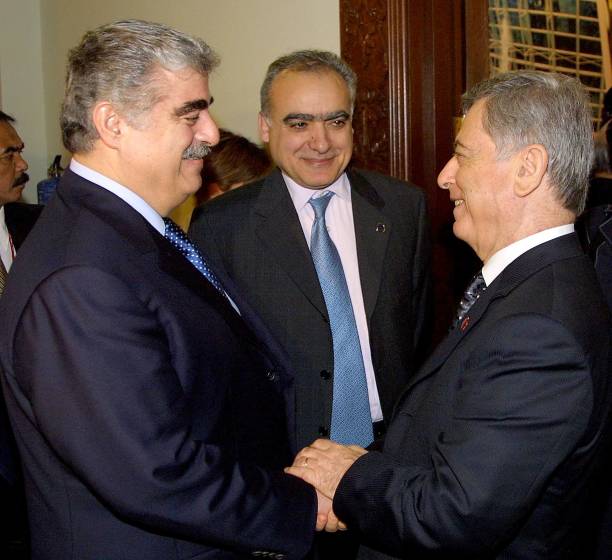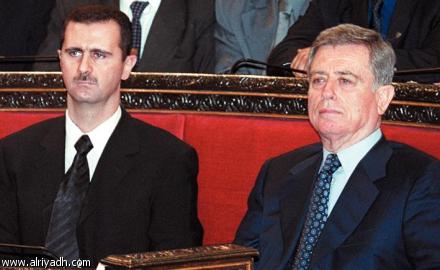Question: Your Excellency, the Lebanese file has been on your desk for more than twenty years. Have the Lebanese exhausted you, or have you exhausted them?
Answer: In reality, it’s not about exhaustion; it’s about the results one intends to achieve. I can say that what has been accomplished in Lebanon brings great satisfaction and doesn’t make the significant efforts exerted feel tiring either emotionally or professionally. Therefore, I can say that dealing with the Lebanese file and the Lebanese issue is part of the work of every official in Syria, given the interconnected situations in the region and the Arab arena. The repercussions of Lebanon’s events on the Arab and regional situations have been significant. Lebanon witnessed tremendous, sometimes worrying, developments during the civil war and the Israeli invasion of Lebanon. Still, it was also uplifting when the Lebanese managed to close the chapter of the Lebanese civil war and move on to a new phase in their lives and national unity. Therefore, I express my satisfaction in dealing with our brothers in Lebanon in various stages of the Lebanese crisis.
Question: After all the efforts you have exerted, are you now reassured that the efforts have been directed in the right place and that the chapter of war in Lebanon has been finally closed?
Answer: Since the crisis began in Lebanon, we had a perspective that has not changed. Our view was that in the civil war and the ongoing conflict, no faction in Lebanon could achieve gains. Instead, it would negatively impact the country, and the Lebanese people would pay a high price in blood and money for a futile war. Based on this, the historic decision made by President Hafez al-Assad to work towards ending the civil war, regardless of the efforts, sacrifices, and blood it might cost, was established. Indeed, we entered Lebanon and managed in the initial stage to halt the civil war in 1976 and convene the Summit of Cairo, as you know. However, other developments in the region, which negatively impacted the situation in Lebanon, occurred. Additionally, Lebanese parties at that time were not ready to enter the stage of national reconciliation due to Israeli intervention. Later on, due to subsequent developments, I can say that Lebanon has taken very significant steps, as I mentioned, and the file of the civil war has been definitively closed.
Let’s make a comparison between the situation in Lebanon before the early seventies and now. Before the seventies, the Lebanese disagreed on priorities and fundamentals. They had different stances towards Israel.
Question: Politically?
Answer: Yes, yes, they used to differ on the identity of the country. Is Lebanon an Arab country, and do the Lebanese have an Arab identity? They also used to differ on how national work should be conducted in Lebanon. Israel entered in 1982, and the Lebanese were divided. There was a faction that welcomed the Israeli army and cooperated with it, all under the backdrop of the civil war. Now, what do we find in Lebanon?
Firstly: National unity is much stronger now than it was before the civil war in all aspects. There is absolutely no one calling for the division of the country or compromising its national unity. There is a Lebanese national consensus on national unity that was not available before or during the civil war.
Secondly: There is a national consensus on the stance towards Israel. Now, there is no segment in Lebanon calling for dealing with Israel or looking forward to such interaction. This is very important and should not be overlooked.
Thirdly: There is a consensus on Lebanon’s identity, that Lebanon is an Arab country. This is a very important issue. There is consensus on the necessity of continuing to build the state and its institutions and achieving the widest possible modernization of the country, reconstruction, and starting anew. These are fundamental matters that the Lebanese agree on. The issue of peace, the stance towards Israel, in the past, it was not the same. In the past, some Lebanese saw Lebanon’s strength in its weakness. Now, the Lebanese see Lebanon’s strength in its resistance to occupation, in supporting the resistance, and in facing adversity. When the aggression happened last April, what did we see? We saw all Lebanese homes in all Lebanese regions open to welcome those who were displaced from their areas due to the Israeli aggression. This is something that should remain in the memory of the Lebanese, and it signifies a very important national development.
The issue of the stance towards negotiations: In Lebanon, there is no political or social faction at all calling for separating the Syrian and Lebanese tracks. Instead, there is a Lebanese consensus on strengthening the cooperation between Syria and Lebanon to confront the occupation and achieve peace and the recovery of occupied lands.
- Lebanon is part of the Arab world –
Question: Does this mean that some Lebanese are becoming desperate about attempting to deal with Israel or relying on a specific change, especially since there is talk about a change after Ulbricht’s visit to Lebanon?
Answer: I don’t want to say that there are Lebanese who are desperate about dealing, or in other words, if the opportunity arises, they would return to dealing. I don’t want to use this phrase because I am convinced that it is not true. There is a conviction among the Lebanese that they must be part of the Arab world, and there is a conviction among the Lebanese that their cause, interests, and future are within the Arab framework. Israel is an enemy to them as it is an enemy to other parties in Lebanon. There are individuals, but basic principles are not built on the positions of individuals. The overwhelming majority of Lebanese society is not desperate and does not want to deal with Israel. In fact, it has become convinced and aware that Israel is contrary to Lebanon.
Question: The dismal failure of Israeli policies and the fluctuations that led to sacrifices in Lebanon for political gains in Israel have firmly established, through experience, that it is not an option in this sense. Your Excellency, I agree with you, but I find a sense of loss. The Lebanese like to find a role. The Lebanese, in their mindset, consider themselves larger than a small country, capable of contributing in some way. Sometimes absurd and sometimes useful. In the useful sense, there is a feeling among the Lebanese that by clarifying the political relationship, they find salvation in the Syrian relationship. No one believes if there is no Syrian presence, but they also find in the Syrian presence an excuse for their politicians not to work, and for their societies to be dependent. So, does the meaning of Lebanese-Syrian cooperation mean that you don’t want the Lebanese to come to you?
Answer: We do not want for Lebanon or any Arab country what we do not want for Syria. We have our own experience, and Syria since 1970, after President Hafez assumed leadership, has built its own unique experience. This experience has been successful in various areas of life, and through the stability achieved in Syria, it has managed to build a strong state with prosperity. We have succeeded in all areas—political, economic, cultural, and services. We want this for Lebanon and every Arab country. When we built our experience, Syrians built it because they are convinced that the country cannot face its enemies, cannot bridge the gap between it and the developed world, and cannot provide the requirements for defense and resilience except through work. Therefore, we did not leave a single minute without being employed in the process of preparation and construction in all areas of life. This is what we want for our brothers in Lebanon. What is said here and there is a kind of evasion of responsibility. Syria does not intervene and has not intervened in Lebanese internal affairs. The main issue being coordinated between the two countries is the matter of peace, peaceful negotiations, and the general stance in the region that both Syria and Lebanon support. As for these rumors that so-and-so went and so-and-so came, we welcome every Arab brother who comes to Syria, and we feel joy and satisfaction when we meet our Lebanese, Egyptian, Tunisian, or Algerian brothers.
- Lebanon has an important role –
Question: However, the Lebanese file is of special importance to you. Clarifying some matters, some say that you may be annoyed by the frequent consultations of a number of Lebanese officials to Damascus, and others say that you may be annoyed by their scarcity. What do you say?
Answer: I believe and state clearly that this talk is not accurate. We have consultations on issues related to Syria, Lebanon, and the situation in the region. Regarding Lebanese issues, we only get involved when it affects stability in the country. We offer advice to our brothers, no more and no less, because internal affairs do not concern us at all.
Lebanon has emerged from a civil war and has its own conditions due to the circumstances of the war. Therefore, the Lebanese must build their experience to strengthen their national unity and enhance their role in the region and from the Arab perspective. Lebanon should regain its role, and the importance of Lebanon in the region does not come from grand gestures but from effectiveness, activity, the ability to work, and contribute. We are optimistic that Lebanon will regain its role and have an important position in the region. Lebanese people, in a short period of time, have managed to close the file of the civil war. When we look at countries that have experienced civil wars in this century, all of them have been torn apart except Lebanon, which emerged stronger and more united after the war. Afghanistan is torn apart, Somalia is torn apart, Yugoslavia is torn apart, Rwanda, Burundi, Congo, all have gone through civil wars and all are torn apart, except Lebanon, which emerged united and strong after the war. This is an indicator that the Lebanese must realize, and it should push them to a new success to strengthen Lebanon’s position and role.
- Trust in Lebanon –
Question: How do you explain that you speak about Lebanon’s future with more optimism than some of its own citizens, and this phenomenon is manifested by greater external confidence than internal confidence in it?
Answer: Lebanon remained exposed to war and bloody attrition for 17 years. Consequently, this long period left a state of psychological anxiety that leads to fear. However, the responsibility of Lebanon’s intellectual, cultural, political, and social leadership is to remove from the minds of the Lebanese what the war left of anxiety and fears. They should clarify to the Lebanese that their country is now in a much better state and that they are heading towards good and happy days.
Despite the Israeli occupation and continuous Israeli aggression and the conditions of the civil war, as I mentioned earlier, there is great confidence in Lebanon from abroad. Therefore, the Lebanese should have more confidence in their country than non-Lebanese. I believe that the Lebanese people and public opinion have confidence in the country’s future, but it is also necessary for everyone to dispel any concerns and clarify to the Lebanese that this anxiety is no longer based on realistic or true foundations.
- Syria with Everyone –
Question: Does Syria stand by all Lebanese or by a specific group of Lebanese?
Answer: Syria stands with all Lebanese without exception. It sees Lebanon as a brotherly country, and the nature of the relationship between the two countries is different from Syria’s relationship with any other Arab country. At a certain stage, there was a minister in Syria who had a brother who was a minister in Lebanon. There is no family in Lebanon that does not have an extension in Syria, and vice versa. This makes Syrians interested in the Lebanese situation. This led President Hafez to make a historic decision to work on stopping the civil war in Lebanon. When Syrian forces entered in 1976, it was not only at the request of the Lebanese state, but also at the insistence of figures like Camille Chamoun, Pierre Gemayel, and the late President Franjieh, who requested intervention. We entered and lifted the siege on Zahle. The forces entered to preserve the national fabric in Lebanon, not to tear it apart. No one can imagine that Syria could be used to undermine Lebanese national unity.
Question: Syria has proven for a long time that it will not support anyone but will stand against any party that seeks to tear this fabric apart. It has been a supporter of the Taif Agreement, which opened new political experiences for the Lebanese. Some Lebanese, particularly among Christians, feel not as politicians but as a community, experiencing what is called frustration, a word that is not accurate as it implies laziness. However, the Taif experience requires the completion of economic, political, intellectual, military, and security aspects for the Lebanese to participate in a new experience. Some in Lebanon say that this experience is not working.
Answer: Of course, because everyone wants to implement it in their own way.



